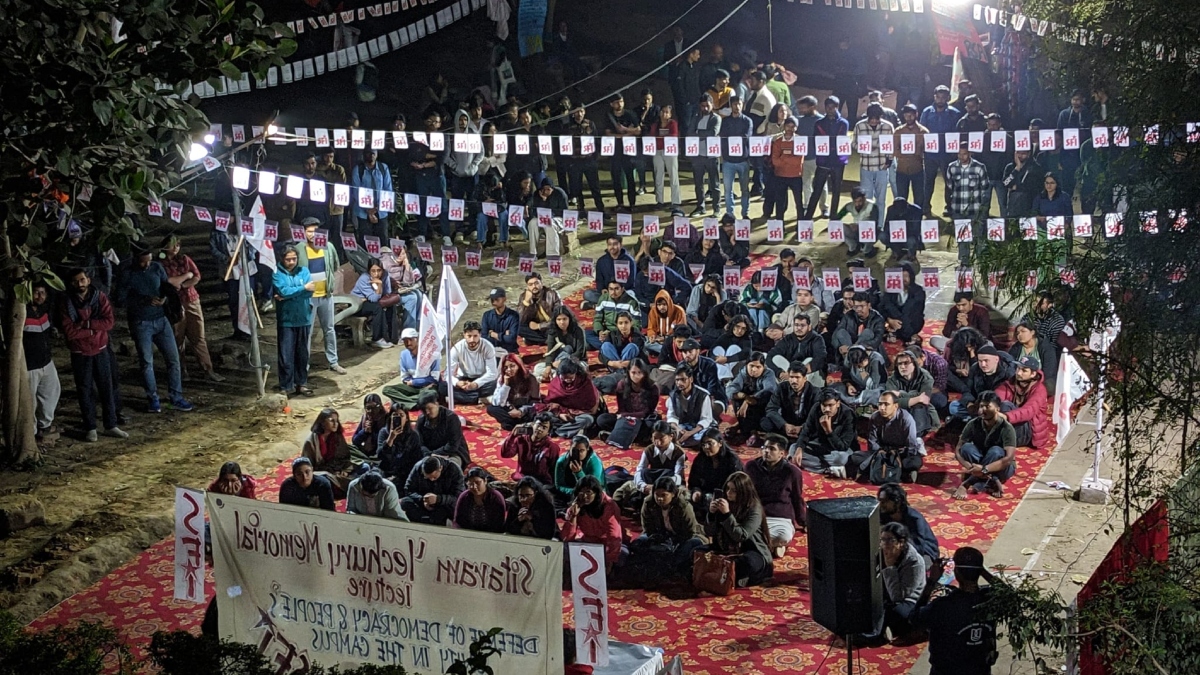JNU prepares for Student Union elections: Will a united Left hold ground against ABVP?
 Image of a SFI-led gathering at the JNU campus used for representation
Image of a SFI-led gathering at the JNU campus used for representation
Jawaharlal Nehru University (JNU) is gearing up for its second consecutive university Students’ Union (JNUSU) polls after 2019. Going by last year's trend, the fight is going to be a close one between the left and the right-leaning student organisations, with the former holding a slight edge. The left-wing student organisations had won the top four posts last year.
Under the election process nominations were filed on April 14, and scrutiny of nominations is underway, after which the list of final candidates eligible for the elections will be announced. The election is set to take place on April 25, Friday, and the result will be announced on April 28, Monday.
The JNU election committee has received a total of 250 nominations for the post of school counselors and 165 for the four central panel posts of the University Students’ Union (JNUSU).
As per the EC, there are a total of 7,960 eligible voters.
JNU has always been considered a bastion of Leftist ideology. Major Left student organisations including the AISA, SFI, DSF, and AISF, have long dominated JNU’s student politics, often campaigning around issues like fee hikes, scholarship delays, hostel fees, and hostel shortages. Even the national issues feature prominently during the campaign.
The newly opened Barak hostel could feature prominently once the campaign starts. The students from the North East are demanding that the majority of the seats be allotted to them, but the university authorities have asserted that hostels cannot be divided along regional lines.
Another major contender in the elections, the RSS’ student wing, ABVP, is contesting on the issues of nationalism, religious pride, and muscular Hindutva politics. As per the JNU students, ABVP's stance on key issues causes polarisation on campus forcing many of the minority votes to consolidate against it.
Shivani, a student of JNU, while talking about the campus issues, said, “Left parties are the ones who raise issues that concern us irrespective of caste and religion. They are the ones who raised the issue of Merit-Cum-Means Scholarship (MCM) as well.” Shivani concluded that the ABVP can not move past ‘Jai Bhavani’ and religious politics and will push forward what Prime Minister Modi is saying.
A crucial factor for this year's election is the alliance between the Left students’ organisations. If the left parties do not form an alliance, it may lead to the division of votes which would help the ABVP gain from this fragmentation.
JNU students argue that the campus politics has been left-leaning since the beginning, but if the left factions lacks unity, this time, the results might shift. The ABVP had won the president’s post only once. This time election is also different as BJP had won the recent assembly polls in Delhi. This may also feature during the campaign. Delhi CM Rekha Gupta is the former Delhi University Students Union president elected on the ABVP ticket.
The ABVP has tried to add glitz and glamour to JNU’s election season as it brought BJP MP and Bhojpuri actor Manoj Tiwari to the campus.
Unlike the Delhi University Students election, which is often criticised for being influenced by money and muscle, JNU polls are dominated by debate and intense campaigning.
As the elections are very close and soon after the candidate list is announced, election campaigns will start, brochures will be distributed, General Body Meetings (GBM), presidential debates will take place and JNU will be witnessing an election changed atmosphere for the next 10 days.
India